Eversolo is barging into the streaming amp arena with the Play — their first foray that’s got the guts to go head-to-head with the WiiM Amp Ultra. This isn’t just another box to toss on the shelf; it’s a “just add speakers” all-in-one powerhouse combining amplification, DAC, and wireless streaming designed to turn your living room into a serious hi-fi setup without wrecking your wallet.
Eversolo Play Crashes the Streaming Amp Party—And It’s Not Just Here to Make Friends
Products like the Eversolo Play, WiiM Amp Ultra, and Marantz M1 are gaining serious traction because they hit the sweet spot of what modern listeners actually want: simplicity, performance, and zero clutter. Consumers are increasingly drawn to one-box solutions that eliminate the need for stacks of components without sacrificing quality.
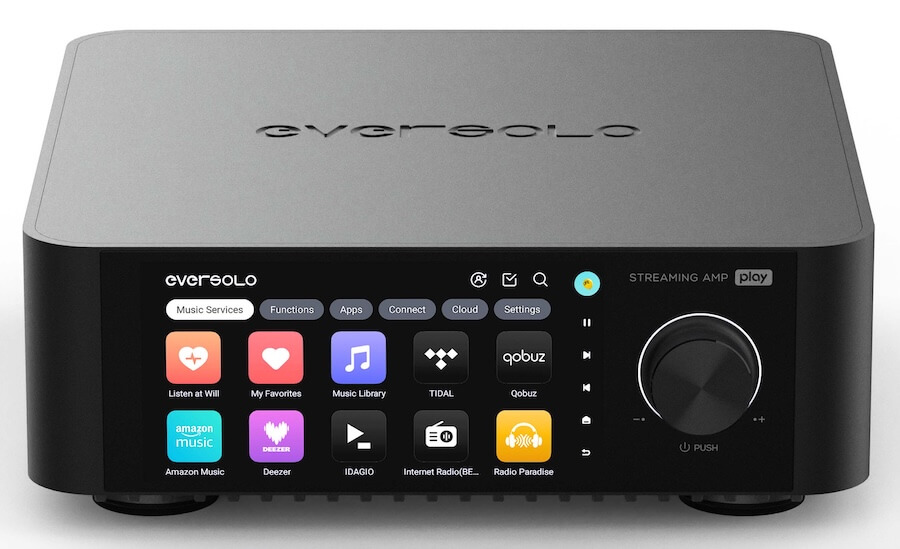
If that single box can drive speakers, stream hi-res audio, handle Bluetooth (especially aptX HD or better), and push music to other rooms with minimal effort, it’s a win. Most folks don’t mind using speaker cables—as long as the setup doesn’t look like a spaghetti explosion behind their media console.
Clean aesthetics, intuitive apps, and seamless access to services like TIDAL, Qobuz, Spotify, and Apple Music aren’t just nice-to-haves anymore—they’re expected. In short, if a device makes life easier while sounding great, it earns a permanent spot in the living room.
One Box to Rule Them All? Eversolo Thinks So
The Eversolo Play doesn’t mess around when it comes to build quality. It’s crafted from a CNC-machined, single-piece aluminum alloy body that not only looks sharp but also beefs up structural strength. This solid construction helps block out electromagnetic interference so your audio signal stays clean and untouched—no weird noise sneaking in. The attention to detail here screams precision craftsmanship, the kind that makes you feel this thing was built to last.
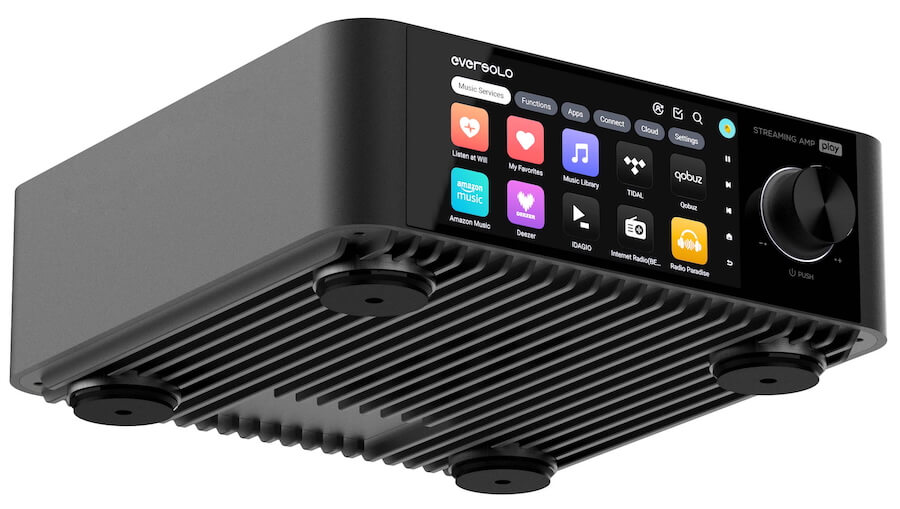
Flip the unit over and you’ll see a full-coverage heat sink spanning a large portion of the underside. This isn’t just aesthetic—it plays a critical role in keeping internal components cool and operating consistently, even under load. It’s a thoughtful bit of engineering that suggests Eversolo paid close attention to long-term reliability as much as sound quality.
Up front, the Eversolo Play features a 5.5-inch HD display with a streamlined, redesigned interface. It’s intuitive to navigate—switching playback modes, browsing playlists, or adjusting settings feels straightforward and responsive. It’s a clean, user-friendly approach that puts the focus on the music rather than the menu.
Then there’s the RGB light ring—because apparently, no modern audio product is complete without a little disco. It shifts colors to “match the mood” of your music: orange for rock, blue for blues, green for country. Useful? Not really. But if your idea of immersive listening involves mood lighting that feels more Best Buy demo than high-fidelity nuance, this one’s got you covered.
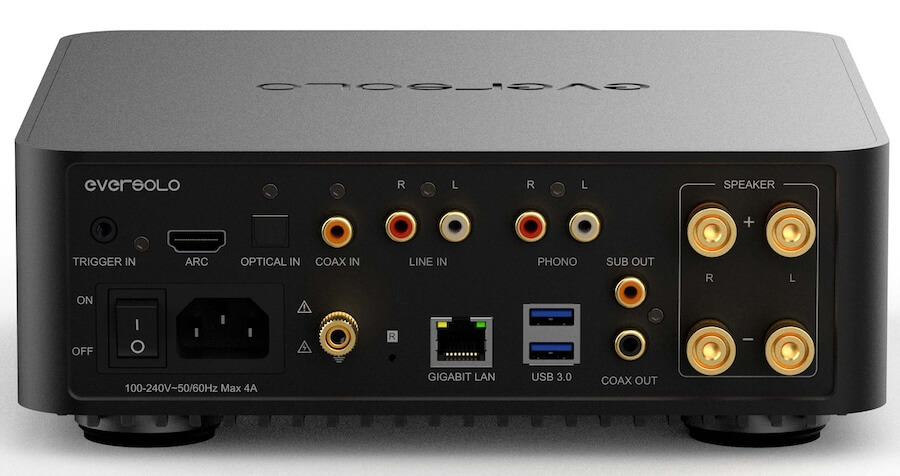
The Eversolo Play may not be a powerhouse in the traditional sense, but its 60 watts per channel into 8 ohms (110 watts into 4 ohms) is more than enough to drive most entry-level to mid-tier passive speakers with authority and clarity. Whether you’re pairing it with a compact bookshelf speaker in a small apartment or something a bit more ambitious in a larger room, the Class D amplification offers solid control, low distortion, and enough headroom to keep things clean at higher volumes.
Eversolo Play Features: Because “Just a Streamer” Would’ve Been Too Boring
Under the hood, the Play packs an AK4493 DAC and a Class D amplifier pushing 60 watts per channel into 8 ohms — enough juice to wring every detail out of your bookshelf speakers. It handles high-res audio like a champ, with support for DSD512 and PCM up to 32-bit/768kHz. Streaming-wise, it plays nice with TIDAL Connect, Qobuz, Deezer, Amazon Music, and TuneIn, and it’s Roon Ready too, so your ecosystem game is covered. Gapless playback with Apple Music? Yes–but it requires another path that we’re still awaiting some clarity on.
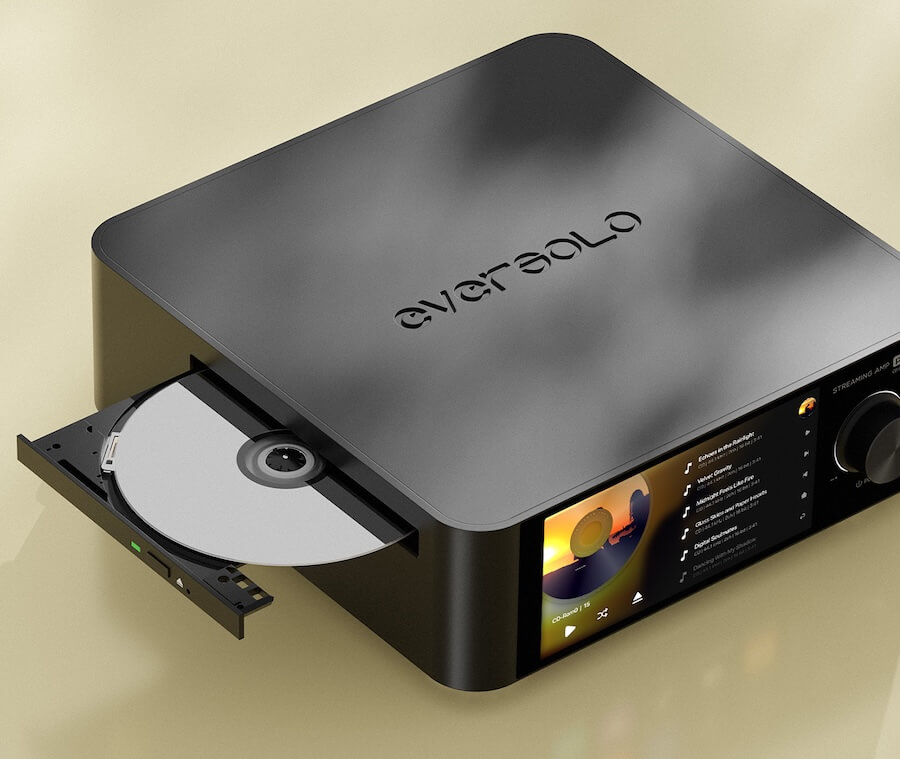
There’s a mobile app that not only controls the Play but also analyzes your room’s acoustics to tailor the sound—fancy. The CD Edition ups the ante with a built-in Hitachi-LG CD-ROM drive, for those who refuse to say goodbye to discs.
Eversolo Control has been updated with a cleaner interface and more intuitive navigation across iOS, Android, and iPadOS. The app also supports multi-device control, making it easier to manage playback from whichever screen is within reach.
On the networking side, the Play supports LAN and cloud storage access via UPnP and WebDAV. It can connect to a NAS or local PC with minimal setup, letting users manage and play back their music library directly from local storage.
The inclusion of Wake-on-LAN allows the Play to be remotely powered on over a wired connection, as long as it shares a network with your device—handy for those who prefer to leave the unit in standby and want quick access without having to physically interact with it.
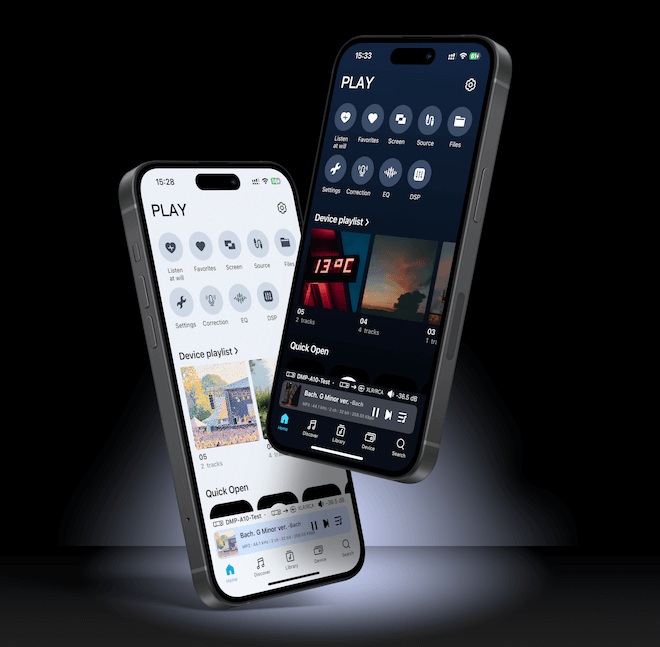
The Eversolo app makes it straightforward to link multiple Play units throughout your home. You can control playback, adjust volume, and switch tracks across different rooms without much hassle.
The “Listen at Will” feature pulls in recommendations from your streaming accounts and local files, offering a mix that steps outside the usual algorithm-driven suggestions. It’s a low-effort way to explore music you might’ve otherwise missed.
Eversolo Play – Key Specifications
Build & Display
- CNC-machined aluminum alloy chassis
- 5.5″ full-color LCD touchscreen
- Dimensions: 230mm (L) x 230mm (W) x 75mm (H)
- Weight: 2.6kg (Play) / 2.9kg (CD Edition)
- Power Supply: AC 110~240V, 50/60Hz, Max 4A
Digital & Streaming
- DAC: AK4493SEQ
- Internal Memory: 4GB DDR4 + 32GB eMMC
- Streaming Services: TIDAL, Qobuz, Amazon Music, HIGHRESAUDIO, etc.
- Streaming Support: Roon Ready, TIDAL Connect, Qobuz Connect, DLNA
- File Support: DSD (DSF/DFF/ISO) up to DSD512, PCM up to 768kHz/32-bit, FLAC, WAV, APE, MP3, AAC, AIFF, CUE
- Control: Touchscreen + iOS/Android/iPad app
Connectivity
- Wi-Fi: Dual-band 2.4G/5G
- Ethernet: Gigabit RJ-45
- USB: 2x USB 3.0
- HDMI ARC: Stereo PCM up to 192kHz/24-bit
- Bluetooth: BT 5.0 (SBC/AAC)
- Inputs: Optical, Coaxial, Line-in, PHONO (MM/MC)
- Outputs: Coaxial, USB DAC, Subwoofer (adjustable 40Hz–500Hz)
Amplification
- Power Output: 60W @ 8Ω / 110W @ 4Ω
- Amp Type: Class D
- Gain: 20.8dB
- THD: <0.0037% (5W @ 1kHz)
- SNR: >109dB
- Frequency Response: 20Hz–20kHz ±0.25dB
- Damping Factor: >107
- Channel Crosstalk: <-108dB
Phono Stage
- MM Gain: 60dB | MC Gain: 74dB
- Sensitivity: MM 5mV | MC 0.5mV
- RIAA Accuracy: ±0.5dB (20Hz–20kHz)
Comparison
Here are some key specification compared to WiiM Amp Ultra
Eversolo Play WiiM Amp Ultra Availability June 2025 Q3 2025 MSRP $699 N/A DAC AK4493SEQ ESS ES9039Q2M SABRE Max Audio Playback 24-bit/192kHz 24-bit/192kHz Display 5.5-inch 3.5-inch Amplifier (@8Ω) 60-watts x 2 100-watts x 2 Amplifier (@4Ω) 110-watts x 2 200-watts x 2 THD <0.0037% 5W at 1KHz -105 dB THD+N SNR >109dB, @A-wt 4Ω110W 120 dB at 5W EQ Yes Yes Room Correction Yes Yes HDMI ARC ARC Optical In Yes Yes Line In Yes Yes Phono Input MM/MC – USB3.0 2x – Coax Out Yes – Sub out Yes Yes Ethernet Gigabit Wi-Fi 2.4G+5G 6E Bluetooth Bluetooth 5.0 Bluetooth 5.3 AirPlay 2 Yes – Google Cast – Yes LE Audio – Yes Alarm Clock – Yes Multi-room Yes Yes Roon Support Roon Ready (pending certification) DSD Support Yes – Voice Remote – Yes Dimensions (WxHxD) 9.1”x 3” x 9.1” 7.9” x 2.9” x 7.9” Weight 5.7 lbs 5.4 lbs 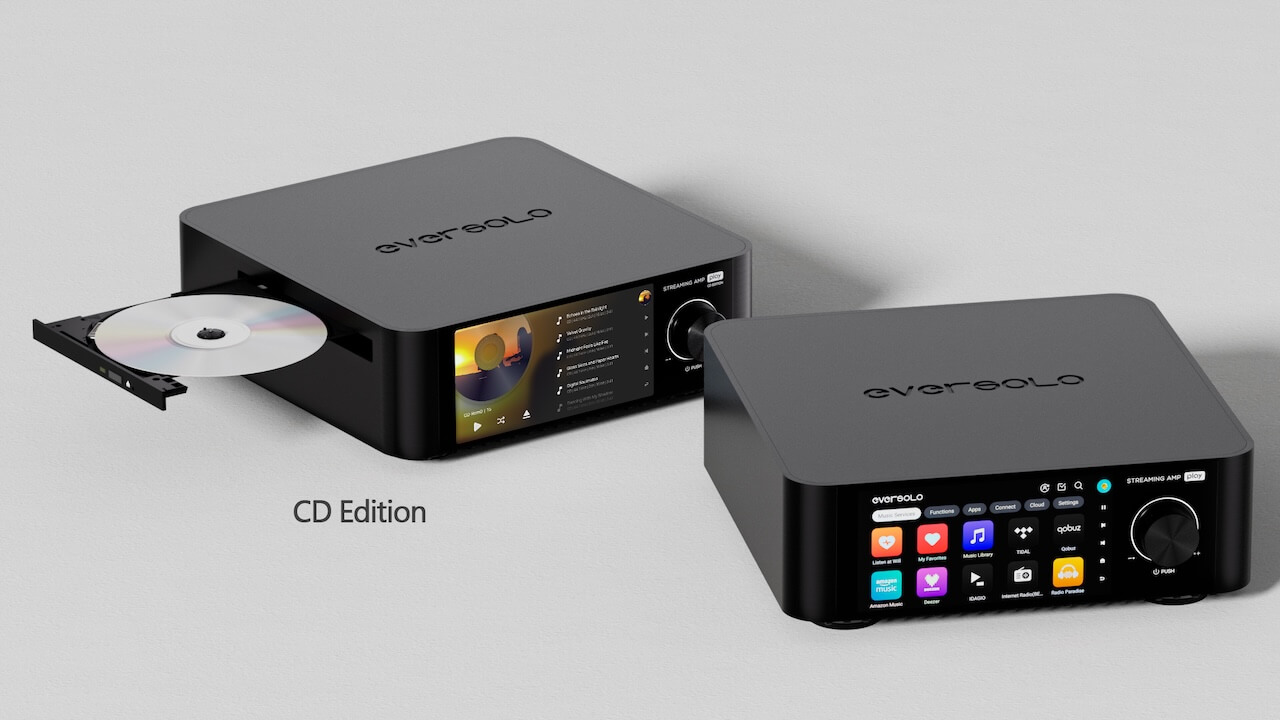
The Bottom Line
It’s remarkable how quickly this category has matured. Not long ago, all-in-one streaming amps were either overpriced lifestyle boxes or undercooked tech experiments. Now, options like the Eversolo Play and WiiM Amp Ultra deliver serious capability and sound quality for well under $1,000.
The WiiM Amp Ultra leans hard into ecosystem flexibility, with support for their new wireless speakers, room correction, and the muscle to drive a wide range of entry-level passive loudspeakers—a smart choice for those looking to scale up without the clutter. The Eversolo Play, on the other hand, caters more to the hi-fi traditionalist with a touchscreen UI, phono input, and high-res DAC under the hood.
The real takeaway? You no longer have to spend thousands to get a high-quality streaming setup. The modern one-box hi-fi solution is here—and it’s actually worth your time.
For more information: eversolo.com
MSRP: $699 or $799 for CD Edition (Coming June 2025)
Related Reading:

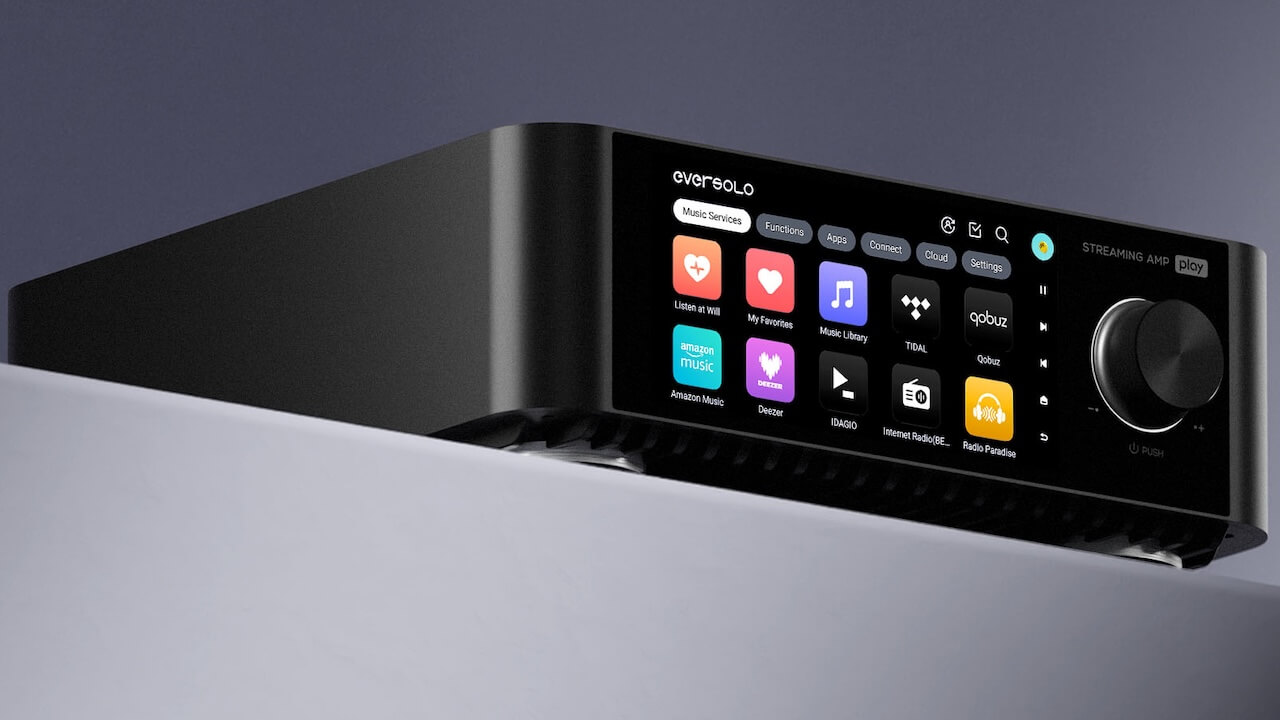
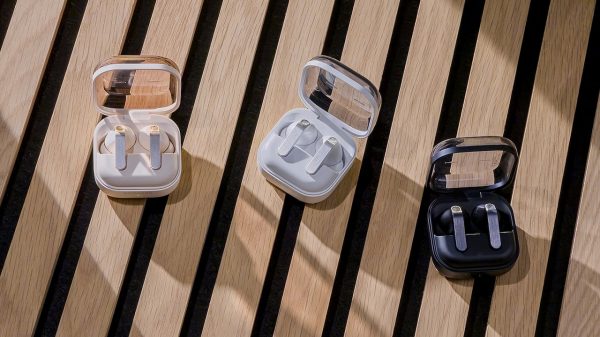






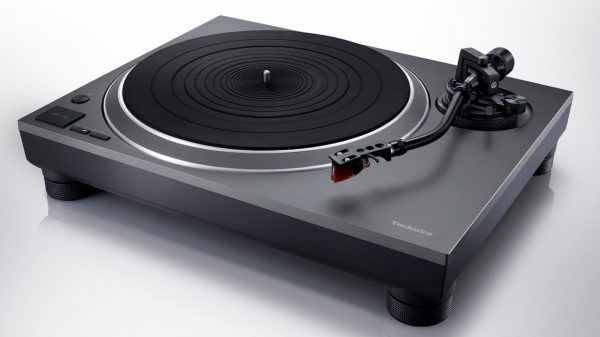

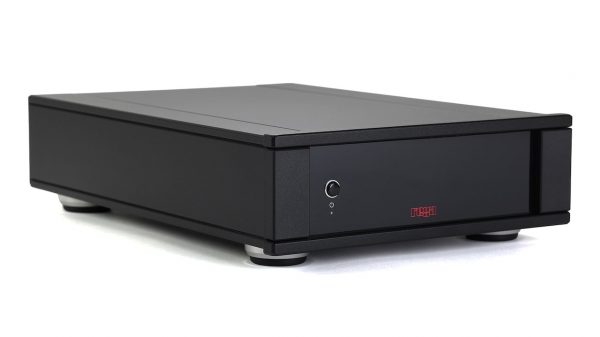
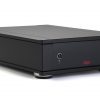
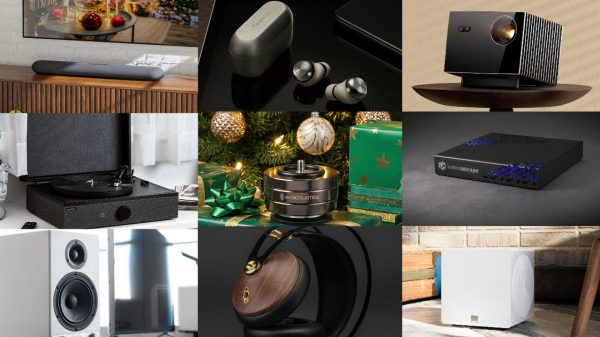


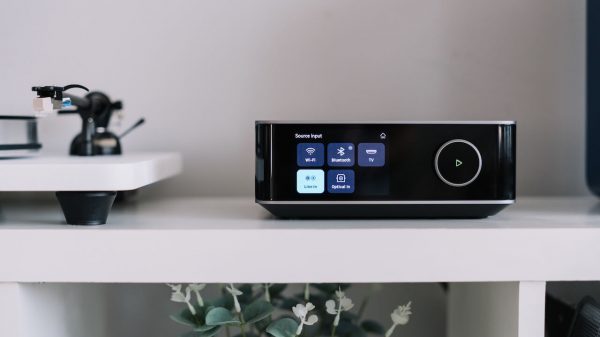
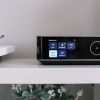
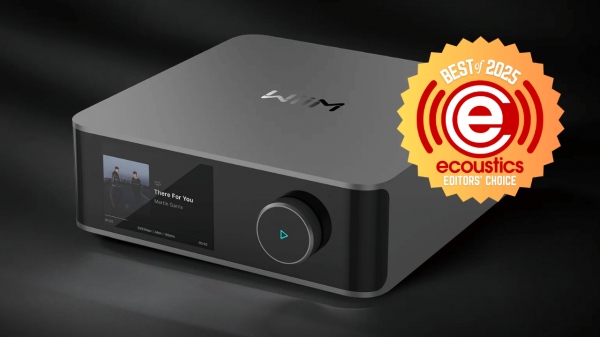
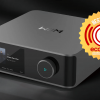


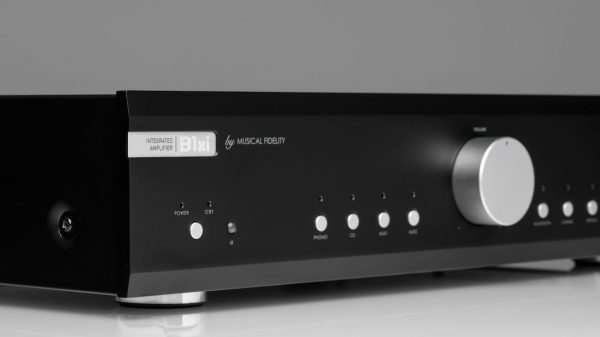
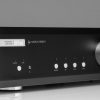
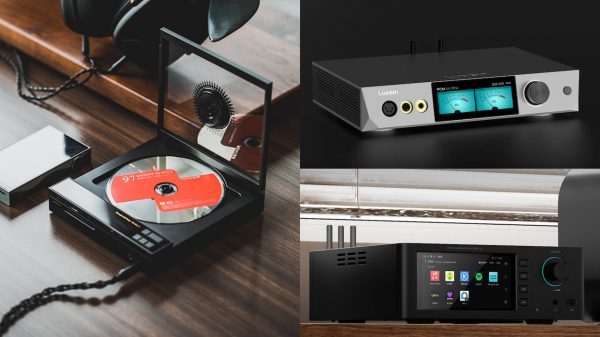
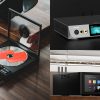
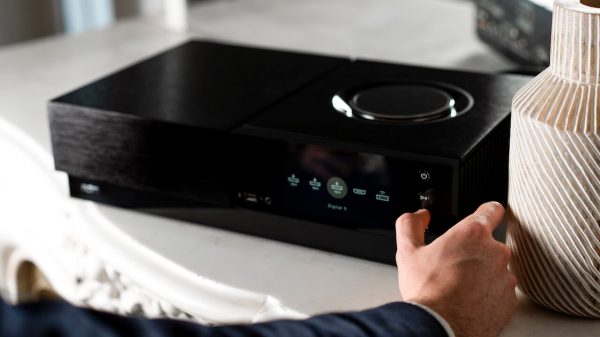

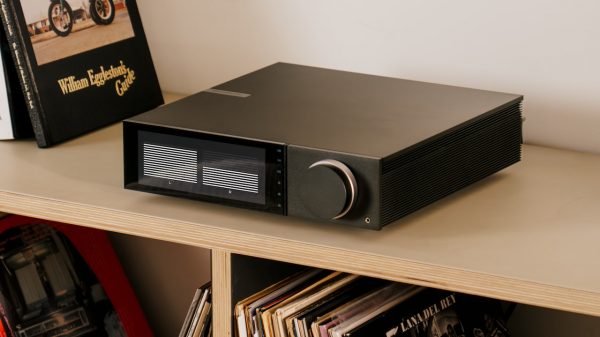
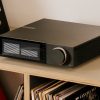











Anton
May 21, 2025 at 5:42 pm
Sigh. So now we have two great options below $700 with similar features and only one supports AirPlay 2.
Any sense for the sonic differences?
Ian White
May 21, 2025 at 5:45 pm
Anton,
Until we have a chance to hear them — impossible to say. Having both the Amp Pro and Vibelink with me, I can say that both WiiM amps have a lot of power, excellent clarity and detail, but neither one is particularly colorful. Most certainly better for darker or fuller sounding speakers.
I like that the Eversolo Play has a CD player. With over 2,000 CDs, that’s something I would use a lot.
IW
Cale Bouscal
May 25, 2025 at 8:21 pm
I read the article and don’t understand what problem we’re solving here. Bad on the author, unclear on the device’s value prop. What capability does this device provider that I can’t get from other setups? Specifically, I use a client/server model for local media (Plex) and streaming provide for non-lical (Spotify, live sports streams, etc). I use android endpoints with apps as needed.
I don’t know what the value prop is here.
Ian White
May 25, 2025 at 10:10 pm
Cale,
Power amplifier, room correction software, analog inputs, digital inputs, network player, DAC, HDMI ARC, phono preamp, subwoofer output, and streaming platform integration. Other than that…nothing. It seems like you’re talking about a core network player with endpoints. This is a complete system in a box with wireless capabilities as well. For under $800 USD. Add a pair of passive loudspeakers and you’re done. Maybe a turntable if you have one.
IW
Matt
May 22, 2025 at 4:38 am
No plexamp support. No buy.
Scott
May 22, 2025 at 4:55 am
Wiim has google cast eversolo does not.
Brian Mitchell
May 22, 2025 at 6:41 am
Good catch. Comparison table fixed.
larry hennessey
May 22, 2025 at 10:45 am
Hi Ian,
A few years back, I bought the Rotel A11 Tribute (largely based on your and Andrew Robinson’s comments about the amp). To do what the play does in one box, I needed a Wiim Pro, SMSL-SU1 (DAC), and Paradigm/Anthem Room Correction module (A.K.A the PW-Link).
I think the two questions most buyers/audiophiles need to ask are: Is music part of your life, or does it dominate your life? If it’s just part of your life, products like the Eversolo are a good choice. If music dominates your life, focusing on true high-end makes more sense.
Technologies like Hi-Res streaming and room correction enable mid-priced systems to exceed the price/value equation. John Darko calls this Future-Fi, and I agree with his characterization.
I’m looking forward to your audio review of the play.
Larry
Ian White
May 22, 2025 at 11:01 am
Larry,
“True high-end” is where you and I veer off in different directions on this one. I understand the underlying point you are trying to make, but “true high end” is whatever someone thinks it is — and not because of its price. I’ve listened to more than a few $100,000 speakers that did nothing for me. There are plenty of people (probably the majority) who have never experienced a good high-end system and if products like the Eversolo Play, WiiM Amp Ultra, Marantz M1–connected to a good pair of passive loudspeakers enhances their enjoyment of music, that’s the best possible outcome. That doesn’t make the rest of us who might want to spend a lot more on a system more “passionate” about music. Music and movies don’t dominate my life. They enhance it.
I find all of these products under $1,000 that offer so much to be a huge step forward for the industry.
Best,
Ian White
Dennis Franz
May 22, 2025 at 11:33 pm
Great comments and wider perspective to quality sound, irrespective of low/ high cost…
larry hennessey
May 22, 2025 at 4:48 pm
Ian,
This would be a great conversation over a pizza at Sally’s in New Haven.
I agree with your thought that high-end is in the ears of the beholder. Where I was going, which I think you picked up on, is that there is a point of diminishing returns with most things in this industry.
I started my career selling high-end audio (before I moved on to computers and software). I worked for John Fuller, the grandson of Fuller Brush, who ran a high-end salon in New London, CT. Except for Mac and B&W, we had a range of other high-end lines. John would encourage us to spend weekend hours in the store (when closed) listening to different combinations of gear, with different music.
We had an array of test equipment that would allow us to quantify what we were hearing. Talk about being a kid in a candy store.
Breaking through the point of diminishing returns takes time and effort that people who aren’t connected to the music don’t want to invest.
In your case, you’ve heard so much gear that your ears are trained to pick up subtleties most people can’t hear.
Products like the play open the door to Hi-Fi, which BT speakers and soundbars can’t. This is a benefit to the industry.
If you find yourself in New Haven over the summer, drop me a note and we’ll meet for pizza.
Larry Hennessey
Ian White
May 22, 2025 at 5:09 pm
Larry,
As my youngest brother lives in New Haven, that is a definite possibility. And we are 100% in agreement in regard to the point of diminishing returns with most things in this industry. I feel like it’s time for high-end audio to actually decide what it wants to be for the next decade. I don’t think it can continue to ignore the middle of the market and there needs to be a greater marketing push for products at the entry-level that are a cut above.
IW
Yurmom
May 23, 2025 at 5:48 am
Still no option for stereo subs. Straight up braindead.
Alex Caire
June 20, 2025 at 2:57 am
I love these products , the form factor and quality under a thousand dollars, do you think the TI ICs that most of these are based on are on par with the UcD amps that still out there , like the Nad d3020 ?
Ian White
June 20, 2025 at 10:34 am
Alex,
It’s a different tonal balance more than anything. I do like the NAD approach more.
IW